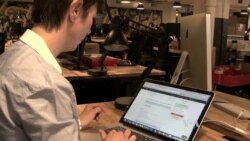One key ingredient to a successful tech startup in Silicon Valley is embracing a culture of openness and a free exchange of ideas, according to many entrepreneurs in the area. It is a mentality that is much less common in some parts of the world.
Colombia native Tania Zapata is the co-founder of a successful tech startup in San Francisco called Torre. She has firsthand knowledge of how much more difficult it is if an entrepreneur does not seek help and solicit the thoughts of others.
"Building a company is not something that you can do on your own," Zapata said. "We tried when we started, and I think that we also fell into a lot of mistakes just because we weren't asking for help. We weren't reaching people. It's very difficult. So it's much better to do it as a group."
Zapata's road to Silicon Valley is an unusual one.
"I used to work in radio and I decided to start my own business as a voice actress, and what I found was that the industry offline was very cumbersome. It was very difficult for me to connect directly with somebody that needed my voice," she said.
Filling a need
Zapata felt the process of connecting voice actors with work was broken. With her husband, who was a tech entrepreneur from Colombia, they created an online business that connected voice actors with clients. That was more than 13 years ago.
The business evolved over time to what it is today: a creative services website. It goes beyond voice-overs, helping clients find writers and translators in many different languages. Her company is profitable, and has offices in San Francisco and Bogota.
Zapata's journey in entrepreneurship taught her the value of the Silicon Valley culture. It is one of sharing, networking and cooperating among people and startups. This type of trust has helped many companies become better and succeed, though Zapata says that in Colombia and other countries in Latin American, it often is hard for people to share ideas.
"I think that's a Latin American mentality or, I would say, a Colombian mentality," she said. “We don't ask for help. We always think people are going to say ‘no’ immediately so we don't even ask. We don't try. Why would this person help me? I think that's very problematic."
Emerging markets
Zapata said the ecosystem for startups is still young in Colombia and other Latin American countries, which makes it a challenge for entrepreneurs to find investors.
"I think in Latin America we tend to be a little more conservative,” she said. “We're definitely risk adverse. When you talk to investors, for example, technology is not something they consider, in general. They want to see a product. They want to see something they can touch."
She tries to mentor some of the entrepreneurs, and she also created a so-called incubator that provides seed funding for startups from emerging markets.
"What we want to make sure is we help the companies with experience, with knowledge, connecting them with people that we had already met that have helped us that can also help these companies not fall into the same mistakes that we fell," Zapata said.
Zapata said she helps other new entrepreneurs because for her and her husband, life is only meaningful when she can give back to others and help make a positive impact in their lives.





